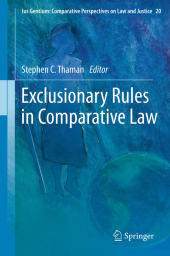 Neuerscheinungen 2015Stand: 2020-02-01 |
Schnellsuche
ISBN/Stichwort/Autor
|
Herderstraße 10
10625 Berlin
Tel.: 030 315 714 16
Fax 030 315 714 14
info@buchspektrum.de |

Stephen C. Thaman
Exclusionary Rules in Comparative Law
Herausgegeben von Thaman, Stephen C.
2013. 2015. xvi, 456 S. 235 mm
Verlag/Jahr: SPRINGER NETHERLANDS; SPRINGER 2015
ISBN: 9400798490 (9400798490)
Neue ISBN: 978-9400798496 (9789400798496)
Preis und Lieferzeit: Bitte klicken
This comparative examination of rules excluding illegally gathered evidence in the criminal trial encompasses 15 country studies, includes a chapter on the European Court of Human Rights and offers a comparative synthetic conclusion.
This book is a comparative study of the exclusion of illegally gathered evidence in the criminal trial , which includes 15 country studies, a chapter on the European Court of Human Rights, and a comparative synthetic conclusion. No other book has undertaken such a broad comparative study of exclusionary rules, which have now become a world-wide phenomenon. The topic is one of the most controversial in criminal procedure law, because it reveals a constant tension between the criminal court´s duty to ascertain the truth, on the one hand, and its duty to uphold important constitutional rights on the other, most importantly, the privilege against self-incrimination and the right to privacy in one´s home and one´s private communications.
The chapters were contributed by noted world experts on the subject for the XVIII Congress of the International Academy of Comparative Law in Washington in July 2010.
Introduction; Stephen C. Thaman.- Part One: The Vicissitudes of Court-Made Exclusionary Tests: Section One: Common Law Jurisdictions.- Chapter 1: The United States: The Rise and Fall of the Constitutional Exclusionary Rule; Mark E. Cammack.- Chapter 2: Ireland: A Move to Categorical Exclusion?; Arnaud Cras and Yvonne Daly.- Chapter 3: Scotland: A Plea for Consistency; Fiona Leverick and Findlay Stark.- Chapter 4: Israel: The Supreme Court´s New, Cautious Exclusionary Rule; Yuval Merin and Rinat Kitai-Sangero.- Part One: The Vicissitudes of Court-Made Exclusionary Tests: Section Two: Civil Law Balancing.- Chapter 5: Germany: Balancing Truth against Protected Constitutional Interests; Sabine Gless.- Part Two: From Nullities to Statutory Exclusionary Rules in Continental Europe: Section One: The Traditional Approach Based on Statutory Nullities.- Chapter 6: France: Procedural Nullities and Exclusion; Jean Pradel.- Part Two: From Nullities to Statutory Exclusionary Rules in Continental Europe: Section Two: From Nullities to Balancing.- Chapter 7: Belgium: From Categorical Nullities to a Judicially Created Balancing Test; Marie-Aude Beernaert and Philip Traest.- Chapter 8: The Netherlands: Statutory Balancing and a Choice of Remedies: Matthias Borgers and Lonneke Stevens.- Part Two: From Nullities to Statutory Exclusionary Rules in Continental Europe: Section Three: From Nullities to Statutory Exclusionary Rules.- Chapter 9: Spain: The Constitutional Court´s Move From Categorical Exclusion to Limited Balancing; Lorena Bachmaier Winter.- Chapter 10: Italy: Statutory Nullities and Non-Usability; Giulio Illuminati.- Chapter 11: Greece: From Nullities to Categorical Statutory and Constitutional Exclusionary Rules; George Triantafyllou.- Chapter 12: Turkey: The Move to Categorical Exclusion of Illegally Gathered Evidence; Adem Sözüer.- Chapter 13: Serbia: Courts Struggle With a New Categorical Statutory Exclusionary Rule; Snezana Brkic.- Part Three: The Fair Trial Test for Exclusion.- Chapter 14: England and Wales: Fair Trial Analysis and the Presumed Admissibility of Physical Evidence; Andrew L-T Choo.- Chapter 15: Taiwan: The Codification of a Judicially-Made Discretionary Exclusionary Rule; Jaw-perng Wang.- Chapter 16: The European Court of Human Rights: The Fair Trial Analysis under Article 6 of the European Convention of Human Rights; Pinar Ölcer.- Part Four: A Comparison of Exclusionary Jurisprudence.- Chapter 17: Balancing Truth Against Human Rights: A Comparative Analysis of the Use of Illegally Gathered Evidence in the Criminal Trial; Stephen C. Thaman.-About the contributors.- index.


